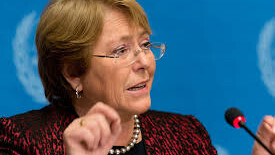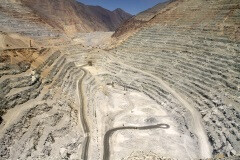Bachelet's Balancing Act
Several months into her presidency, it's becoming clear that Michelle Bachelet is walking a fine line between continuing Chile's fine economic record and delivering reform. LatAm INVESTOR looks at how this impacts investors...

Reforming Chile
When left-wing president Michelle Bachelet came to power in March this year many Chilean businesspeople were scared. Bachelet had already had a successful stint as president between 2006 to 2010, but this time she’d promised to be far more radical. As The Economist put it, Bachelet won the election “on the most left-wing platform Chile has seen in 40 years”. She announced sweeping fiscal, educational and constitutional reforms that some worried would unsettle Chile’s economic miracle.
But this month Bachelet’s government agreed to compromise on the new tax reform which has gone a long way to assuage initial fears. One of her key election pledges was to fix the country’s education system by investing a further $8.2billion a year in schools and universities. That’s about 3% of Chile’s GDP. Keen to keep Chile’s good macroeconomic reputation, she’s not going to borrow the money but fund it through tax increases. Corporation tax looks likely to be gradually increased to 27% from 20%, while a tax loophole for rich people and companies is being closed.
"the most left-wing platform Chile has seen in 40 years…"
That will provide a short-term hit to companies operating in Chile, but over a longer period it should help the economy. Chile is the only South American member of the OECD – informally known as the club of rich nations. But it is not a rich yet.

Chile has been on an incredible economic run - the GDP has grown at an average annual rate of 5.5% for more than quarter of a century – but its not quite there. For it to achieve true developed economy status it would need to boost productivity.
For example, Diego Hernandez, CEO of London-listed Chilean miner Antofagasta is quoted in Bloomberg as noting that “We’re paying developed world wages and getting developing economy productivity.” And many other employers must feel the same as Chile has the second-lowest productivity score in the OECD, ranking below the likes of Hungary and Estonia.
Chilean policymakers are only too aware of the dangers of getting stuck into the middle-income trap. Lots of developing countries manage to industrialise but few – Japan, Korea and Singapore are notable exceptions – manage to push on to become rich developed economies. But improving education is one way to boost productivity, by creating a more capable workforce.
But what about Dr. Copper?
The thinking behind the fiscal and education reforms are sound. The main worry, however, is that they are coming at the wrong time. That’s because Chilean growth is stalling. The Central Bank recently admitted that 2014 GDP growth could be as low as 3%. That might not sound too bad for the UK but for Chile it would be a serious underperformance.
Reasons for the falling growth vary. Some say that international companies have been scared by the tax proposals and have delayed investments. It’s too early to say if that’s true but another, more obvious, culprit is Dr. Copper. The red metal accounts for 60% of Chile’s exports and 15% of its GDP but has been on the slide since the start of 2013, losing around 15% of its value. In another piece of atrocious timing, this is happening just as Chile’s mining costs are increasing.

A recent report from the country’s copper commission calculates that production costs have jumped by 350% over the last decade. This is due to high wages – Chilean miners earn more than counterparts in the US – high electricity bills – the country has struggled to keep up with demand – and falling ore quality. Some of these problems can be fixed. For example, extra investment could boost the productivity of the country’s older mines. But it’s clear that Bachelet will face a challenge to increase investment in mining and education simultaneously, while maintaining the country’s prudent macroeconomic stance if copper prices continue to slide.
Foreign investors will have to buy into the reform package if Bachelet is to pull off this tricky balancing act.